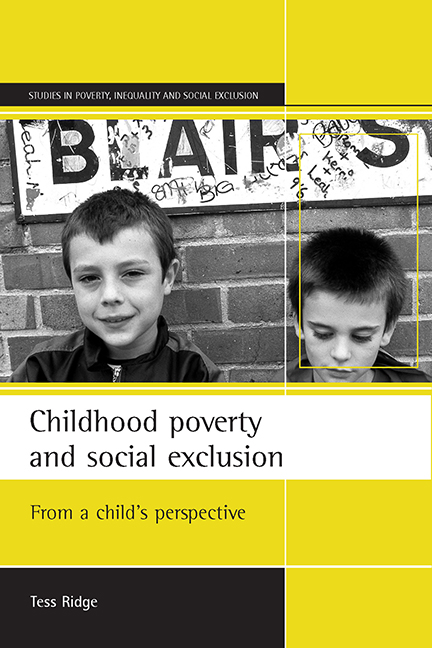Book contents
- Frontmatter
- Contents
- List of tables and figures
- Acknowledgements
- one The challenge of child poverty: developing a child-centred approach
- two What do we know about childhood poverty?
- three Children’s access to economic and material resources
- four ‘Fitting in’ and ‘joining in’: social relations and social integration
- five Family life and self-reflection
- six Experiences and perceptions of school: analysis of the BHPYS data
- seven Childhood poverty and social exclusion: incorporating children’s perspectives
- References
- Appendix BHPYS Wave 7
- Index
seven - Childhood poverty and social exclusion: incorporating children’s perspectives
Published online by Cambridge University Press: 20 January 2022
- Frontmatter
- Contents
- List of tables and figures
- Acknowledgements
- one The challenge of child poverty: developing a child-centred approach
- two What do we know about childhood poverty?
- three Children’s access to economic and material resources
- four ‘Fitting in’ and ‘joining in’: social relations and social integration
- five Family life and self-reflection
- six Experiences and perceptions of school: analysis of the BHPYS data
- seven Childhood poverty and social exclusion: incorporating children’s perspectives
- References
- Appendix BHPYS Wave 7
- Index
Summary
Throughout this study, the children have been open and informative about their lives, and we have gained an invaluable insight into their everyday experiences, and the issues that concern them. In this final chapter we reflect on those insights and explore how incorporating the perspectives of children and young people from low-income and disadvantaged families into policy and practice can contribute to a greater understanding of childhood poverty and social exclusion.
What we have learnt from listening to children and young People
Listening to the accounts of children and young people has revealed how the effects of poverty and disadvantage can permeate every aspect of their lives; from the material and more quantifiable aspects of their needs, to the social and emotional requirements so important for children, both in childhood and beyond. The first area of concern highlighted by the qualitative findings (Chapter Three) was children's and young people's limited access to their own autonomously controlled economic resources, particularly in the form of pocket money. Just over a quarter of the study sample received pocket money on a regular basis, and some of these children received it only conditionally, in return for household chores. Nearly three quarters of the children and young people in the study did not receive any pocket money at all, or received it only on an irregular basis. As we would expect, many of those children and young people who did receive pocket money spent it on sweets and treats. However, they were also managing their money in a socially productive way, saving up to purchase clothes, items for school, bus fares and so on. In this way they were able to go some way towards sustaining themselves in areas where they were experiencing considerable disadvantage. For these children and young people, pocket money served as a vital socioeconomic resource, facilitating their capacity for sustaining social interaction and engagement with friends, and providing them – albeit in small measure – with an element of economic autonomy and control in an environment that is characterised by scarcity and constraint. For those without pocket money, work appeared to be the main way to resolve their complete lack of independent income (see below).
- Type
- Chapter
- Information
- Childhood Poverty and Social ExclusionFrom a Child's Perspective, pp. 131 - 152Publisher: Bristol University PressPrint publication year: 2002



